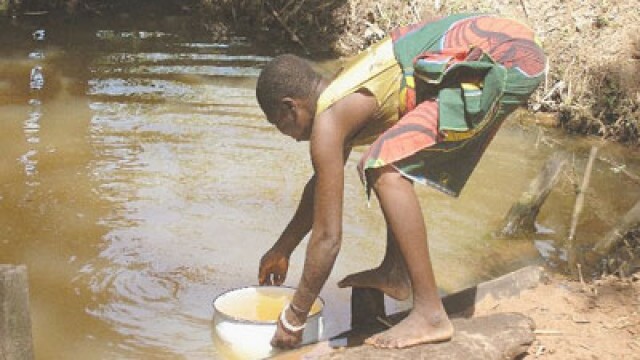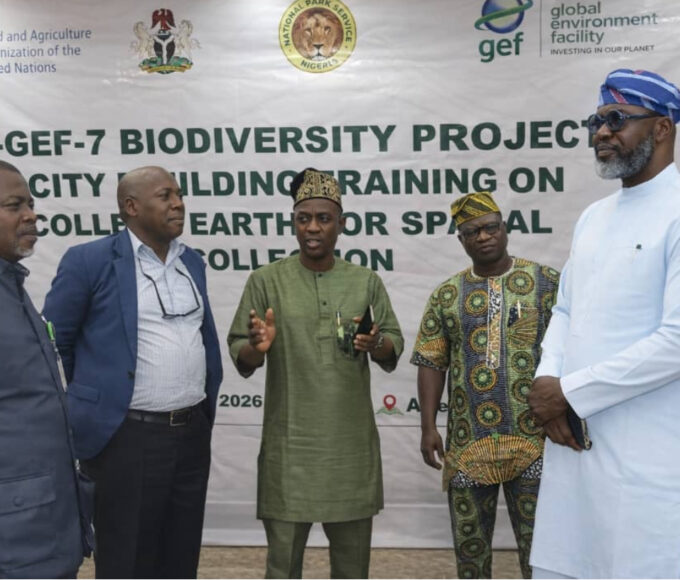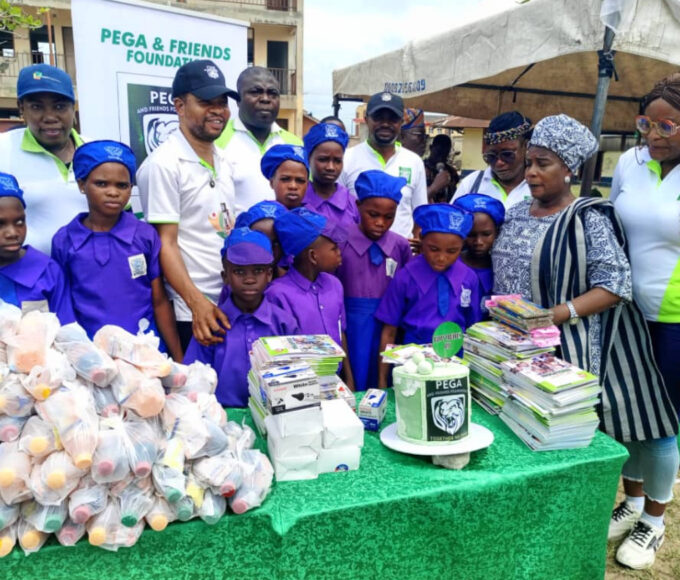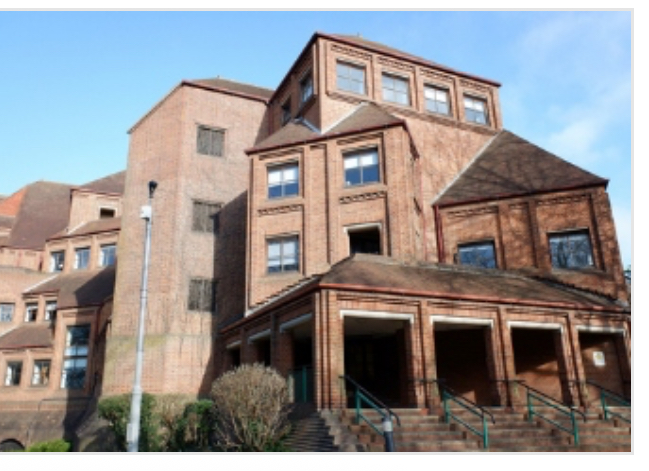Few years ago, the extremely virulent disease, Cholera, shook a bustling village, Tonawo, in the Obafemi Local Government Area of Ogun state, Nigeria.
The disease, which is always caused by drinking and using contaminated water, claimed a life in the village. FREEDOM TIMES writes on how residents of this village suffer, risk their lives as they lack access to health care, good roads, education and other social amenities.
According to the WHO, in 2018, there were 120,652 cholera cases and 2436 deaths caused by it, with a case fatality ratio of 2.0% in Africa, with Nigeria having 45,037 cases, 836 deaths, and case fatality rate of 1.9%.
In 2019, there were 55,087 cholera cases and 872 deaths caused by it, with a case fatality ratio of 1.6% in Africa, with Nigeria having 2,486 cases, 43 deaths, and case fatality rate of 1.7%.
Also, in 2020, there were 47,256 cholera cases and 741 deaths caused by it, with a case fatality ratio of 1.6% in Africa, with Nigeria having 596 cases, 47 deaths, and case fatality rate of 7.9%.
In the same vein, in 2021, there were 141,467 cholera cases and 4,094 deaths caused by it, with a case fatality ratio of 2.9% in Africa, with Nigeria having 111,062 cases, 3,604 deaths, and case fatality rate of 3.2%.
Lastly, in 2022, there were 100,437 cholera cases and 1,955 deaths caused by it, with a case fatality ratio of 1.9% in Africa, with Nigeria having 23,839 cases, 597 deaths, and case fatality rate of 2.5%.
As of July 2, 2023, a total of 2,052 suspected cases, including 55 deaths, have been recorded.
Since the establishment of Tonawo village, over 100 years, residents rely solely on a river, as they wash their bodies, clothes in it, and still drink from it, use it for cooking and many more.
Without the ‘contaminated river’ residents in this village would either trek miles to source for water or wait for rain water, as there is no other means to get water in the village.
Tonawo main source of water
During the year 2018, an unfortunate incident happened when a resident of the village, Orunsola David, who also drinks from the river, contaminated the deadly disease, Cholera.
“As he was defecating, he was at the same time vomiting,” a witness, and wife of Tonawo Baale, Mrs Sunday recounted.
Residents of Tonawo, having noticed him, tried to rush David to the Federal Medical Center, FMC, Idi -Aba, Abeokuta for proper treatment which is miles away from the village as there’s no other public hospital around the axis.
However, even when it would take over two hours on bike to get to the FMC, lack of deplorable road denied them easy movement, leaving David to die before getting to the hospital.
David’s incident is just little of what might happen in the future to Tonawo people, expert says as sources of water in the village have worsened.
Contaminated smelling water
Apart from the contaminated, not flowing river, there’s a well, which is deep and smelling, not suitable for washing or drinking, serving the people of Tonawo.
The lack of hospital, good water and accessible roads have deprived residents of Tonawo life full of excitement as they live unfulfilled, accepting their wacky fate.
This has been the ordeal of Tonawo people for over 100 years since its existence, contributing to the already established problems, resulting in the slow exodus of people, as the village goes into extinction.
Bad road caused by erosion
Village almost perished over lack of road
Tonawo village
Embarking on the path to Tonawo village is an arduous undertaking for FREEDOM TIMES.
The route, marred by erosion and riddled with endless potholes, presents a daily challenge for the resilient residents of Tanawo, testing their fortitude against adversity.
Children going into Tonawo
In proximity to Tonawo, FREEDOM TIMES encountered determined children, who showed the way to the almost perished village.
The children were sun-kissed and clad in worn clothes, returning from Sogbamu village, a 10-minute trek to procure biscuits—a testament to the village’s scarcity of essentials.
The concept of convenience eludes Tanawo village, unveiling a distressing narrative of hazardous roads, water scarcity, power outage, inadequate healthcare, and an ever-present shadow of insecurity.
Amidst these hardships, a poignant tale unfolds—the gradual exodus of villagers.
Abandoned and destroyed building in Tonawo
Once thriving, Tanawo now teeters on the edge of extinction, with only a few witnessing its decline.
Upon reaching Tonawo, a scant number of standing houses revealed the village’s abandonment and decay.
Mrs Maria
Tanawo Baale’s wife, Mrs Sunday bitterly recounted the village’s transformation from bustling to a ‘no-go area.’
Having lived in Tanawo for over 35 years, she lamented the absence of social amenities despite the village’s age, attributing the decline to the lack of infrastructure, particularly roads hindering businesses and pushing residents away.
Mrs. Sunday stressed the struggle to transport goods due to impassable roads, emphasizing the impact on the community’s ability to sell products it produces like Garri, cassava, corn, vegetables, tomatoes, and pepper.
Mrs Ajose
Echoing her sentiments, Mrs. Ajose Deborah, a resident in the village, expressed the village’s underdevelopment, bemoaning the lack of business opportunities and the necessity to trek to Olorunsogo, an almost 2hrs journey on foot, for basic needs.
“We don’t sell anything here anymore, we used to but now we don’t sell any more because of the lack of roads and the state of the country.
“The road makes us hungry because whenever we make Garri, cassava, corn, vegetables, tomatoes, and pepper, we are not able to transport them to the market as there is no cab here.
“Instead, we put the farm products on our heads and take them to the bus stop at Olorunsogo…, Then from Olorunsogo , we go to the market.”
Residents further decried the deteriorating road conditions, emphasizing its adverse effects on their activities.
The Baale’s Wife underscored the limited mobility, with residents venturing out only once a week unless they possess a bike.
“We go out only on market days, the road doesn’t make us see what the city looks like whenever we want to as we would be spending so much if we want to.”
Mr Wesu
Wesu Alaba, a frustrated farmer in Tonawo, shared his plight, highlighting the challenges of transporting goods to Kuto and Lafenwa without proper roads, adversely affecting their pricing and livelihood.
The shared sentiment among residents paints a vivid picture of Tonawo’s struggle for survival, grappling with infrastructural neglect and its far-reaching consequences.
Residents lack access to hospital, practise unsafe home birth
Women in Tonawo village have never given birth to their children in a hospital, according to Mrs Sunday.
“We all give birth at home, we only depend on God, and since we’ve been giving birth, it has been successful,” she said.
Ignoring all risks involved, they still resolve to use contaminated water to clean and feed their newborn babies.
The World Health Organisation, WHO, had warned that mothers and newborns should receive postnatal care within 24 hours of birth, and at least three additional visits within the first six weeks.
However, in Tonawo, no care is being given to mothers and newborns as they lack access to hospitals.
Children and aged persons in the community also suffer as they don’t get necessary treatment whenever they fall ill.
“We use herbs, concoctions if we want our children to get better,” the Baale’s wife said.
Mrs Deborah who is a mother in the village confirmed Mrs Sunday’s statement, stressing that they quickly rush to the FMC whenever their children’s condition is critical.
“We don’t have a hospital, and the health center available is very far from here. As bad as our road is, we rush our children there, and sometimes we have to call nurses to attend to them.”
Alaba, couldn’t hide his frustration as he spoke about how lack of hospital has made him go through pains on many occasions.
Alaba stressed that, as a farmer, his body aches after work, but lack of easy access to drugs and health facilities has made him not productive.
According to him, he had to travel miles away, spending over N700 on transport before he could get drugs from any patent medical store.
Mrs Adenike
Confirming these claims, Mrs Adenike Jimoh, a lifelong inhabitant and eldest resident of the village, expressed the enduring lack of government-provided amenities.
She voiced that for over a century, Tonawo has remained shrouded in darkness, expressing the enduring lack of government-provided amenities.
She lamented the myriad challenges afflicting Tonawo, citing blocked roads that hinder movement and contribute to their collective hardships.
In addition to these struggles, Mrs. Jimoh highlighted the impediment faced by children in accessing secondary education within Tonawo.
Despite these adversities, it was gathered that Tonawo’s residents actively participated in the recent general and gubernatorial elections, casting their votes at a nearby polling unit in Sogbamu.
Amidst their difficulties, the residents earnestly called upon the government to intervene, addressing the pressing issues of darkness, inadequate infrastructure, education barriers, and overall deprivation faced by the community.
Expert raises alarm, predicts likely disease to befall village
Dr Akande
Tonawo village faces a health crisis as Dr. Tanimola Akande, a Public Health Practitioner, sounded the alarm about the foul-smelling well in the community.
Dr. Akande identified sewage contamination as the likely culprit, emphasizing the need for a minimum distance of 30 meters between wells and latrines to prevent contamination by human waste.
The contaminated well water poses a serious risk of gastrointestinal infections due to microbes present, according to him.
Dr. Akande therefore urged residents to avoid using the compromised water source and emphasized the crucial task of identifying and halting the source of contamination.
Additionally, he underscored the importance of communities like Tonawo ensuring access to safe water sources to prevent health-related issues such as “cholera, typhoid, hepatitis A, and other diarrheal diseases.”
LG chairman urges residents to direct concerns for targeted solutions
The Chairman of Obafemi Owode, Lanre Ogunsola, advises residents in the local government to direct their concerns to the LG secretariat for effective resolution.
Ogunsola, conveyed through the council’s spokesperson, Segun Soneye, emphasized the necessity of residents communicating their complaints, as it is challenging to be aware of issues affecting all 600 communities with over 25,000 individuals in the LG.
While acknowledging that the challenges faced by Tonawo are shared by many communities, Ogunsola pledged commitment to improving their circumstances.
He urged residents to designate a representative to approach the local government, either through the director of information’s department, and schedule a meeting with him, the vice chairman, or a supervisor.
To streamline efforts, he proposed residents prioritize their concerns, understanding that the LG may address one out of three identified issues within a specific community axis.
He said, “we would meet them, but they should send a representative to the local government directly, they can come through the director of information’s department and fix a date to come to the local government and meet me, or the vice chairman or any supervisor.”
Ogunsola therefore encouraged residents to proactively channel their issues to the appropriate local government representatives for focused and efficient resolution.
















Leave a comment